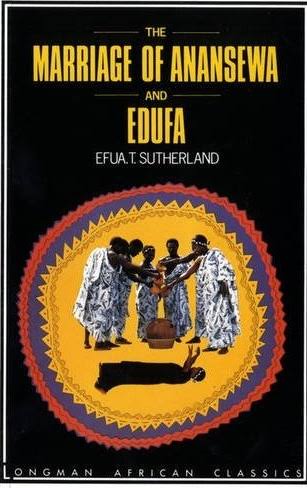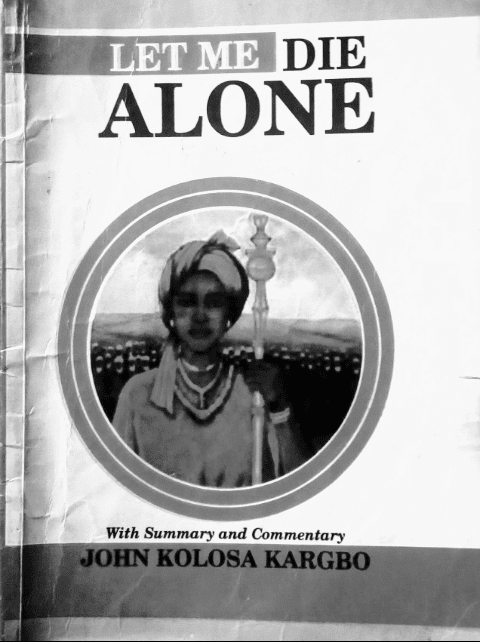The characters in Dele Charley’s The Blood of a Stranger are Kindo, Mr Whitehead, Maligu, Soko, King Santigi V, Wara, and Parker. Each of these characters has their significant role in the play. Who are these characters anyway?
Kindo
Kindo is the protagonist hero in Dele Charley’s The Blood of a Stranger. He is the son of King Santigi V and thus, the heir apparent to the throne of Mandoland. He is also the chief warrior of Mando and Wara’s husband-to-be.
Kindo is a patriotic citizen who is concerned about the welfare and sanity of his people. He displays this through his constant warnings about the evil intents of Maligu and Soko. He also stands in the way of the white man and his cohorts who give the people of Mandoland intoxicants with the intent to make them misbehave and lose their sense of judgement. Kindo confronts the white man and his African conspirators.
He is a prognostic character. He continually has the eerie feeling that something bad is about to happen and that both Maligu and Soko are up to no good. He tries to explain this queer feeling to Wara all to no avail. He also attempts to make the king, his father, see the illogicality of welcoming a stranger to Mandoland and how the cordial embrace would contravene an earlier traditional injunction that no stranger should be welcomed to the land. But no one seem to listen to him.
Kindo also protects the traditional values of Mandoland. This is shown in how he handles Mr Whitehead and his African right-hand man, Mr Parker after the both refuse to pay obeisance to the king as demanded by the customs and traditions after several days of being in Mandoland. He orders that Mr Parker should be flogged by the number of his age and he also suffers the white man with the ignominy of prostrating to him.
Kindo is portrayed as a man of action who will do anything to preserve the sanctity of the land when those vested with the power of doing so are not living up to the task. When his numerous warnings, complaints, premonitions, and suspicions do not produce the intended result in the king, Kindo takes the law into his hand and acts the only way he knows as a warrior to salvage the messy situation of Mando. He kills Parker for killing Soko and he is expelled from Mando through the manipulation of Mr Whitehead. However, before he goes into exile with his warriors, he leads the manipulative white man to his own manipulative death. He promises to come back after the king’s death to claim his rightful position as the next king of Mandoland.
Mr Whitehead
Mr Whitehead represents the scourge of colonialist exploitation in Africa. His role in the play signifies the moral corruption of African traditional values.
He is a very manipulative and deceptive person. He manipulates Soko and Maligu to do his bidding. To the people of Mandoland, he is a white tobacco farmer who will build for them a school which their children will have access to with the proceeds of tobacco. But within himself and to Maligu, he is just another white man who has come to exploit Africa of its resources. He is in Mandoland primarily because he wants to mine diamonds. For a hitch-free exploitative process, he has to get the people out of the way. First, in connivance with Soko and Maligu, he gives the villagers (and later the king) intoxicants which make them misbehave. Then, he hatches a grand scheme that sees the vengeful murder of Parker by Kindo for killing Soko, the exile of Kindo, and the disowning of Kindo by the King.
In other words, in order to get his diamonds, he manipulates the King, the villagers of Mandoland, Soko, and even the cunning Maligu who later gets the better of Mr Whitehead.
Mr Whitehead holds no pretence to the civility his white contemporaries claim to have brought to reform a primitive Africa. He is a long gulf away from it. He is an arrogant, disrespectful rapist and murderer. He would have successfully raped Kindo’s woman, Wara, in connivance with Maligu and Soko, if Wara had not bitten him and escaped. He also has a hand in the murders in the play. He instructs Parker to kill Soko knowing that Kindo will find Parker and do just the same to him.
He influences King Santigi V to banish his son and chief warrior, Kindo and to also disown him. Mr Whitehead would later meet his waterloo in Kindo’s spear.
Finally, by the etymology of his name, “Whitehead”, Mr Whitehead embodies the colonial imperialism that shook Africa to its root and all the other evils the colonialists inflicted on the African continent.
Maligu
Maligu is the chief adviser to King Santigi V of Mandoland. He is responsible for the coming of Mr Whitehead to Mandoland. He claims to have received a letter from his brother in the city about the coming of the white man to Mandoland with the intent to farm tobacco. When Kindo asks to be given the letter, Maligu refuses to hand over the letter even when Kindo clears air on his literacy. It is obvious that Maligu has fore knowledge of the white man’s true intent.
All through the play, he does everything to ease the way for the white man for his own personal gains. He blackmails Soko so the latter can fall in with his plans and concoct a prophecy that would usher in Mr Whitehead.
The playwright portrays Maligu as a chronic betrayer. He betrays the trust reposed in him by the king and the people of Mandoland. He misleads them for his personal interests. He abuses his position as the chief adviser to the king for his private profits. Along the way, he will also betray his co-conspirator, Soko. The height of his betrayal is when he betrays Mr Whitehead when Kindo serves his judgement on the latter for bringing disaster to Mando.
After his involvement in the white man’s evil plans is revealed, then egoistic Maligu is left at the mercy of a weak, gullible king.
Soko
Soko is the chief priest of Mandoland. He holds the most sensitive and sacred position in the land. He is considered the medium between the gods and the human beings. Thus, his words are not taken with levity because they are seen as coming directly from the gods themselves. His duty is to relay the messages of the gods to their human subjects and convey human appeals to the gods for action. This explains why when he prophesies the coming of a white stranger and the required sacrifice of a virgin stranger, no one except Kindo challenges the illogicality of his prophecy in view of the existing tradition because they believe the words are divine words. In other words, Soko is the mouthpiece of the gods and it is his words that actually grant the white man entry into Mandoland.
Soko does not have any child of his own who as required by tradition will assume the task of the chief priest after his demise. Soko also lives in the luxury of a hut in contravention of the tradition that says that he should sleep and wake in the sacred cave where it will be easy to commune with the gods. It is therefore easy for Maligu to hold him by the jugular on these grounds and tell him to concoct a prophecy that negates the one that prohibits the entry of a stranger.
By acquiescing to Maligu’s demands, Soko inadvertently becomes Mr Whitehead’s errand boy. It gets worse to the extent that Mr Whitehead orders Soko and Maligu to bring Wara to him to be raped.
When Soko eventually wants out, Mr Whitehead has him killed by Parker.
King Santigi V
King Santigi V is the king of Mandoland and father of Kindo. The sovereignty of Mandoland rests in him. Even though he has Maligu for his chief adviser and Soko as the chief priest, decision-making is his exclusive duty as the king. That he is manipulated by Maligu, Soko, and later Mr Whitehead shows how gullible he is.
He seems a little detached from the plight of his subjects than he should be and more committed to religious rites than expected of him. King Santigi is portrayed as a diehard traditionalist. This much is reflected first in how he fails to see reason in Kindo’s admonishments, and then how he allows Mr Whitehead to manipulate him using the dictates of the tradition. Laws and traditions should not be entirely rigid; they should be interpreted based on context. For King Santigi, this is not so. He banishes his son and disowns him for violating the tradition that no killing should be done during peace time; even when the latter appears to be doing what is in the best interest of the kingdom; even when it is apparent that a tradition is bent to pave way for Mr Whitehead’s entry into Mandoland. If Soko can bend the rules using the facade of a false prophecy, I honestly don’t know why King Santigi V could not do the same.
That Mr Whitehead drugs the king at some point in the play also rings a bell. It emphasizes King Santigi’s carelessness and susceptibility.
In other words, King Santigi V is gullible, rigid, unassuming, uncreative, and less of a leader. He lacks restraint in the affairs of the land’s customs and traditions.
Wara
Wara is Kindo’s fiancée. She knows her place as her man’s supporter though she thinks Kindo is unnecessarily worked up by needless suspicions and premonitions. Like the rest of the kingdom, she has mixed feelings of fear and veneration for Soko because of the divine power he wields.
She is a victim of the atrocious activities of Mr Whitehead’s syndicate. First, Mr Whitehead singles her out for rape probably to get back at Kindo for humiliating him at the palace. The fighting spirit of Wara however delivers her from this iniquitous intent of Mr Whitehead. Then after her escape from the trap net of Mr Whitehead, Soko is deployed to instil fear in Wara so she will not be able to report the case of the attempted rape to Kindo. Soko tells her she is the virgin stranger chosen by the gods for sacrifice, being that her maternal forbears were strangers cum war captives. He then implores her to leave Mandoland immediately. From Wara’s point of view, it appears that Soko is doing Wara a favour whereas he is only doing that to cover his track of heinous activities.
Parker
Parker is the white man’s African right-hand man. He is some sort of Man Friday to Mr Whitehead. Parker acts as Mr Whitehead’s interpreter, errand boy, and African guide. Parker is an archetype of brainwashed Africans who think looking condescendingly on African cultural values makes them civilised in the Western way or professing the Western culture makes them better than other Africans.
People like Parker make it seem as if both African and Western values are antithetical when in actual fact, the two can complement each other.
Mr Whitehead would instruct Parker to kill Soko, an action that would get Parker killed. That Parker obeyed this order shows that he believes wholly in the rightness of the white man’s decisions and can barely think independently. The fact that Mr Whitehead sends Parker on such suicidal mission shows the little or no regard Mr Whitehead has for Parker’s total committal to his service.
Further Reading:
 WHATSAPP: Click HERE to join the new Literature PADI WhatsApp group to receive latest updates on your phone and for further literary discussions!
WHATSAPP: Click HERE to join the new Literature PADI WhatsApp group to receive latest updates on your phone and for further literary discussions!










